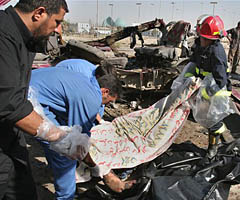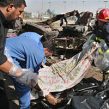Internal Jihadist Criticisms of the War in Iraq
Publication: Terrorism Focus Volume: 3 Issue: 1

Evidence continues to mount on the growing disaffection with the methodology of the mujahideen in Iraq. One of the most public demonstrations of this occurred on January 6 when the residents of Ar-Ramadi, considered a hotbed of support for the Sunni Arab insurgency, publicly blamed “al-Qaeda in Iraq,” the insurgent movement led by Abu Mus’ab al-Zarqawi, for relatives killed and wounded in bomb blasts at a police recruiting station that killed 80. The applicants were Sunni Arabs, responding to the broadening of the recruitment drive to include all segments of the Iraqi population. Polls conducted across the Middle East, particularly following the Amman bombings, attest to a change in broad public opinion, but views on the more committed jihadi forums generally remain resilient. Yet here, too, evidence of a change in tone can be found.
An interesting, and at times quite heated, recent debate on the internet between two jihadi supporters of the insurgency in Iraq highlights some new areas of criticism. The Minbar Suriya al-Islami (latterly Minbar al-Sham) site (www.nnuu.org/vb) hosted an exchange on December 15 between participants who signed themselves Yusuf ibn Tashufin and a “senior member” of the forum Abu Umar al-Shami. Tashufin’s discussion, which he opened with caution knowing the likely reaction it would excite, concerned the lack of coordination and strategy among the mujahideen. He insists at the outset that criticism is not to be continually dismissed “on the grounds that the mujahideen in the field know more than you do.” Tashufin then asks whether jihadi supporters, who are now suffering from confusion, do not have the right “to know what is being done around them with reasonable transparency? Why do the infidel American whites have the right to progress reports of their armies, while Muslims are not allowed to air their fears to the mujahideen or offer their advice?” There are many mistakes being committed in Iraq, he insists, and asks the following:
· How is it that George Bush has managed to bring together the extremist Shia and the vile secularists, the atheist communists, nationalist Kurds and Sunni Arabs, these contradictory tendencies, under one roof against the mujahideen?
· How can this dog set up his throne in Baghdad, and why are all the people with him against us? After all, millions of Iraqis responded to Bush’s call [to vote in parliamentary elections]—this is a fact—do you not agree that this is a victory for the Infidel, even if we do call it a mere passing or moral victory? Why did we fail to secure a fraction of what this filthy Crusader has achieved? Is he smarter than us?
· Why do we have 20 Salafist groups fighting in Iraq? Why did the experienced leader Abu Mus’ab al-Zarqawi fail to unite these groups at a time when he is able to wield considerable material and logistic capabilities?
Tashufin then rounds off with a demand made in the name of all supporters of the jihad in Iraq: “Leaders of ours, despite all our respect for you, we do not agree in any way with this disunity and fragmentation. The [Islamic] Nation cannot accept this miserable shape of things. You must make concessions among yourselves and consult with each other so as to present us with a single leader. Enough of these fiery sermons holding out the promise of an ‘ideal’ Islamic state in Baghdad without any serious steps! The Nation, O Jihadi leaders, requires plans, not sermons!”
Al-Shami responds that jihad has three established phases—guerrilla warfare, semi-conventional warfare and conventional war—and that activities in Iraq are still in the first phase in which a centralized command and authority would be vulnerable. Tashufin dismisses this, citing the examples of Afghanistan and Chechnya where doctrinal and political decisions “are issued from a single front.” Contrasting this with Iraq, he notes a dangerous precedent in the killing last November of a member of the political bureau of the Sunni Iraqi Islamic Party Iyad al-Azzi. While al-Qaeda described the killing as “an aim of the mujahideen, since he was an ‘apostate,'” the Jami Battalions, al-Fasail al-Ikhwaniyya and the Islamic Army described the victim as “a righteous leader, and supporter to the mujahideen whose killer is a criminal.” Al-Qaeda, he notes, responded with a threat to anyone wishing to contest the matter. “I may be far from the battlefield,” Tashufin observes, “but I think an armed confrontation is definitely coming.”
After deploring Tashufin’s insult to the mujahideen and its potential effect of “discouraging youth from following the mujahideen’s example and seeking God’s reward in martyrdom,” al-Shami issues a long, rhetorically florid diatribe against the machinations of the world media and the collaborationist ulema scholars. His point, buried in all this, is that the jihadi supporters are indeed well-informed, due to the success of the mujahideen in outflanking the media through their conquest of the internet. Furthermore, he calls for trust, rather than “believing the infidel and the hypocrites” who are concealing their true losses or “philosophizing and theorizing safely at home,” and regards criticism as unseemly and un-Islamic.
Tashufin response, that al-Shami is “missing the point,” excites al-Shami to argue, amid personal vilification, that al-Zarqawi has not united the “contradictory tendencies” under one roof against the mujahideen, since “where in the long history of Islam did the forces of disbelief, polytheism, apostasy and hypocrisy not gang up against Muslim believers?” As for the “throne” and the “victory of the infidel,” al-Shami insists, “why do you talk of this, when their own military and political experts in America talk in a tone of commiseration, warning about a crushing defeat for America in Iraq?”
Arguing that division, fragmentation, ad hoc and individualist decision-making, and the unnecessary opening of multiple fronts are threatening the jihad, Tashufin almost predicts the events of January 6, noting that “Sunni politicians are going to call decisively for volunteers for the army and the police, and the preachers, traders, local notables and tribal leaders will support them in this.” If the National Guard, dominated by Shi’a, is to be swelled by members from the strongest tribes of the region, the Sunnis of the Dulaym and Jabur tribes, “ask yourself, brother: are we going to blow up cars among them too?” Americans, he warns, are winning politically and “will spend their time relaxing outside the towns while we fight the Sunnis in Ramadi and Falluja for decades.”
The mujahideen, Tashufin continues, should “beware of believing that continuing booby-traps and explosions are an indication of the legitimate success of the jihad … What do you think will be the implications for us of the elections in Iraq in the Sunni zones? Dear brother, throwing up dust in the eyes does not mean that the problem will go away. If we do not face facts and solve these problems things will not be very much different from the situation in Algeria in the 1990s.”
Not only the hosting of the debate on the jihadi forum, but also the course it has taken, indicates the growing dilemma facing the Islamist mujahideen in Iraq, whose inchoate political thinking is impeding a coherent strategy with markable goals. Indeed, al-Shami’s responses throughout the debate are illustrative for their predominance of tone over substance. This is because the mujahideen, while having frequently to respond to criticism, have been adept at defending their actions from the standpoint of Islamic propriety (albeit mixed with some utilitarianism where necessary). Other works attest to this, such as the extensive e-Book Tasa’ulat wa-Shubuhat hawl al-Mujahideen wa-‘Amaliyatihim (“Questions and Doubts Concerning the Mujahideen and their Actions”), which dedicates a chapter to the jihad in Iraq. The subjects covered there do not extend beyond comparative tactics. Tashufin’s comprehensive criticism, framed in purely realist and strategic terms, is unfamiliar ground.




